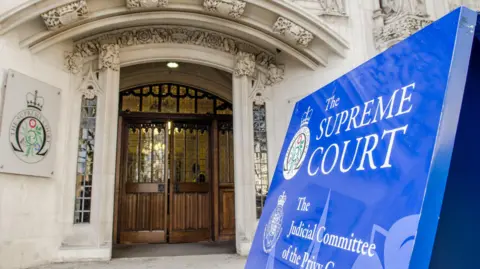
The United Kingdom’s Supreme Court is at the center of a pivotal legal battle this week, deliberating on the definition of “woman” in the context of the 2010 Equality Act.
The case, brought forth by the campaign group For Women Scotland (FWS), challenges the inclusion of trans women—those with gender recognition certificates (GRCs)—within the legal definition of women.
At stake are fundamental questions about how UK law treats sex, gender identity, and the balance of rights between diverse protected groups.
This legal dispute, though rooted in a relatively niche Scottish law aimed at boosting female representation on public boards, has escalated into a case of nationwide significance.
The judgment could reshape how public institutions navigate single-sex spaces and broader anti-discrimination measures.
A Clash of Laws and Definitions
At the heart of the case lies a critical question: should the legal definition of “woman” hinge on biological sex assigned at birth, or does it extend to those who have obtained a GRC?
The 2004 Gender Recognition Act (GRA) introduced the GRC, allowing individuals to legally change their gender. A GRC ostensibly alters a person’s sex “for all purposes,” but the Equality Act of 2010, which protects against discrimination on the basis of sex, gender reassignment, and sexual orientation, uses a simpler definition: a woman is “a female of any age.”

FWS contends that conflating biological sex with legal sex undermines the rights of women, particularly in areas like single-sex services, sports, and employment.
“Not tying the definition of sex to its ordinary meaning means that public boards could conceivably comprise of 50 percent men and 50 percent men with certificates, yet still lawfully meet the targets for female representation,” said Trina Budge, director of FWS.
The Scottish Government’s Position
The Scottish Government, defending its stance, argues that the GRA and the Equality Act complement each other, enabling individuals with GRCs to legally be treated as their acquired gender.
According to the government’s legal counsel, Ruth Crawford KC, the 2010 Equality Act contains “clear indications” that GRC holders should be recognized as their acquired sex under the law.
This perspective aligns with a December 2022 ruling by Judge Lady Haldane in Scotland, which affirmed that sex under the Equality Act could include those holding a GRC.

This decision, now under Supreme Court scrutiny, has been labeled by FWS as a “legal fiction” that compromises sex-based rights.
The Supreme Court’s ruling could have profound consequences for various public and private domains. Supporters of FWS argue that allowing GRC holders to access women-only spaces—such as hospital wards, prisons, and support groups for survivors of sexual violence—could erode protections for biological women.
Critics of this perspective counter that excluding GRC holders risks discrimination against trans individuals, a minority group already facing significant societal challenges.
The stakes extend beyond trans rights.

Some campaigners fear that any reinterpretation of the Equality Act could set a precedent for rolling back protections for other groups. Meanwhile, legal experts highlight the pressing need for clarity.
“Public bodies have been left grappling with how to reconcile these laws,” said a spokesperson from the Equality and Human Rights Commission, which is intervening in the case.
They have called for Parliament to revisit the Equality Act to eliminate ambiguities.
This case also highlights the political volatility of gender issues in the UK. Scotland’s 2018 Gender Representation on Public Boards Act originally included trans women in its definition of women.
However, FWS successfully challenged this provision, arguing it exceeded Holyrood’s legislative competence by conflicting with the reserved Equality Act.
The Scottish Government later revised its guidance, stating that the Equality Act’s definition of woman includes those with a GRC.
This prompted a fresh legal challenge from FWS, culminating in this Supreme Court showdown.
Politicians in Westminster and Holyrood have largely sidestepped direct involvement, wary of the intense public debate surrounding gender identity.
While former First Minister Nicola Sturgeon championed self-identification reforms, her successors have taken a more cautious approach.
At the UK level, the Conservative government has toyed with the idea of redefining the Equality Act but faced opposition from equalities groups concerned about potential rights rollbacks.
What’s Next?
With the hearing involving five Supreme Court judges, including court president Lord Reed, the legal arguments are expected to be exhaustive.
FWS, represented by Aidan O’Neill KC, has urged the court to confront the “patriarchy” by affirming sex as an immutable biological trait.
Meanwhile, the Scottish Government insists that Parliament intentionally designed the GRA to enable legal recognition of gender changes under the Equality Act framework.
A decision is expected to take months, and its repercussions will reverberate through legal, political, and societal spheres.
For now, both sides await a judgment that will either reinforce or reshape the boundaries of sex and gender in UK law.





